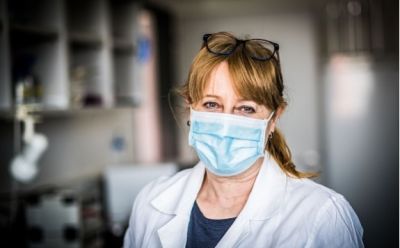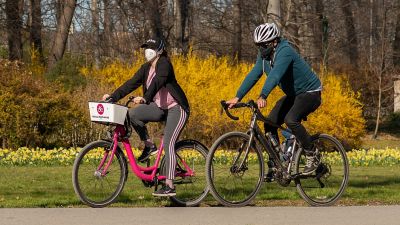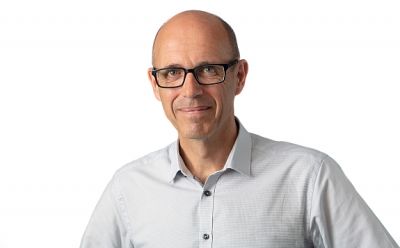As a little girl, she dreamed of one day working as a veterinarian and animal conservationist in a national park in Africa. Her love of animals led her to study zoogeography (resp. geography). Today, Dagmar Dzúrová teaches about the One Health programme at the Faculty of Science, taking a transdisciplinary approach to optimal health that recognises the balance between humans, animals and plants in nature. During the pandemic, Professor Dzúrová kept the Czech public abreast of developments, including, sadly, the mortality rate of Covid-19.
In February 2020 – less than a month before the first three Covid cases were confirmed in Czechia, Dagmar Dzúrová, virologist Ruth Tachezy and immunologist Jan Černý – organised two related academic debates for a packed hall of students at Albertov, home of CU’s Faculty of Science. Professor Dzúrová’s final slide in her presentation featured the following information: on the one hand, that the World Health Organisation was optimistic that China had managed to keep the epidemic under control, but on the other that WHO was nevertheless worried the virus could reach Europe. One of the guests at the lecture was epidemiologist and later health minister Roman Prymula, who said he didn’t think Europe would “fall”.
Three days later, Dzúrová and her family were on vacation in Italy when the first Covid-related deaths at a nearby skiing resort were reported. The demographer and her family cut short their stay and returned to Czechia. “I tried to gather all available information, and it quickly became obvious to me through the nature of my work, that the situation was uncertain and dangerous. We forgot about our ski passes and immediately returned home.”
Professor, forgive me for starting off with this, but what has it been like to be known in the media over the past year-and-a-half, largely in the context of explaining the mortality rate?
For me it’s not unusual: mortality is a common demographic and epidemiological term. As a demographer, social geographer and supervisor of a Master's degree programme in social epidemiology, it’s a statistic I deal with regularly. Yes, it is linked to the end of life and its analyses and of course it’s preferable to focus on the quality and length of life or health rather than mortality analysis. But the present, unfortunately, brought what it brought: we do not yet have data on health and the different stages that preceded death from Covid-19, which is why most of the work today focuses on mortality and mortality rates.
Might the pandemic boost an interest in the study of demography or social epidemiology?
It’s possible. It is probably a good thing that the pandemic raised the field’s popularity and perhaps its prestige as well One thing I did not enjoy seeing was how many experts from other fields did not hesitate to wade in and comment on demographic aspects... But certainly, social epidemiology gained in importance during the pandemic and it appears it would be useful to have more graduates in this field. That is something I am currently thinking about, which should be improved.
I like it when people are passionate about a cause. It's an ordeal for me when a student doesn't know what they're actually passionate about, despite telling you that they're
“passionate about everything.” In reality, some of them are stuck and don’t really know what they want to end up doing. As the result of this pandemic, there are new faces in our field. And new personalities from other disciplines: Covid brought together many people from different fields across different continents, albeit often online.
What kind of shape were Czechs in, health-wise, before the pandemic?
Admittedly, many weren’t in the best of health. Our population is associated with a high burden of risky behaviour regarding health, especially when it comes to alcohol consumption and smoking. And the worse off a population is health-wise at the start of a pandemic, the more severe the consequences can logically be expected. Numerous studies confirmed that Covid-19, is much more difficult to manage in people who are overweight and have risk behaviour associated with a range of health comorbidities. In short, we were not quite fit from the start.
On the other hand, it is worth highlighting the very high standard of the Czech healthcare system. Both in terms of quality and quantity. We saw how effective it was even under very difficult circumstances, the height of the pandemic, when hospitals were expected to collapse – but the health system eventually managed. There was a cost: how many health professionals left everything on the floor and were pushed to the limits? I found it hard to accept how a part of the public underestimated Covid or ignored epidemic safety measures. But when they got sick with Covid, they understandably demanded top-notch treatment.
Is there a chance that we will learn from the pandemic and learn to take better care of ourselves?
I believe so. Every such experience can be valuable. If we take the Spanish flu 100 years ago, it is almost forgotten and something we had no experience with. Certainly many people will learn from the Covid pandemic. There are some of course who never learn, as we have also unfortunately already seen.
Will we ever reach a point when we will be able to say Covid is behind us?
In my opinion, we will not ever return to the same situation as before the pandemic. There will simply be a “post-Covid era” from now on. We will never be completely carefree again. I take Covid-19 as a warning that another similar threat could occur at any time. Of course, I'd like for the period to be over and we are lucky to have vaccines available. Now it’s a matter of getting the maximum out of it. We should learn to live with the virus and not die from it, ie. learn to live, but actively - ie. with vaccination, compliance with basic hygiene measures, and so on.
What are some takeaways from the pandemic?
The darkest aspect of the whole pandemic is that so many people have died needlessly, more than 30,000 people in Czechia. I have a very hard time coming to terms with that. For God's sake, don't let anyone say that this is a natural process... It is a terrible human tragedy that could have been better prevented and not just in terms of needless deaths. The worst part is that people with Covid die completely alone, separated from their families, in infectious diseases wards in the company of staff in full protective suits. That is no way to die, unable even to say farewell to loved ones. The medical staff could not caress a patient’s hand or provide solace. Surely no one wants to die like that.
If we come back to the public, you said the health of the population is not great. But it’s never too late to improve. Do you have any recommendations?
(laughs) If you look at me, you can see that I would also need to do something about my own weight. I tell my students, “Life is about dealing with risks.” In short, sometimes we take more risks, and then we go back to less risky behaviour. For example, it is common for young people to “have to” try cigarettes. They need to experiment. But it is important that they realise when the experiment ends and the threat of uncontrolled addiction begins... but I digress. I haven't gone to the gym in a long time, opting instead for walks or hiking in the countryside. In the winter, I hit the slopes for downhill skiing, in the summer, I bike. But I am an occasional sportsperson: I know I should step up.
How did you get into geography and demography?
As a girl, I originally wanted to be a veterinarian. I had read all of James Herriot's books, I devoured Joy Adamson’s Born Free. Living with monkeys, lions, dogs and other animals became my world! I could see myself working as a conservationist in a national park in Africa. In high school, however, my friend's dad set me straight, explaining to me what veterinary medicine was really about, that my dreams of caring for lions and cuddly animals was a little far-fetched and that I would most likely start in a barn helping to birth calves in the late evening or early morning hours...
So I rethought my daydreams and took a detour into zoogeography, where there are still “those animals”, with Africa and wandering around the world in mind. So it was actually a great love of animals that led me to geography but then I became more interested in their behaviour and the environment they live in, with the many different aspects of life for both humans and animals... that was when everything came full circle.
And that's also because you also lecture in social epidemiology on the concept of One Health.
Exactly. Within social epidemiology, we also, albeit marginally, focus on the One Health approach - through achieving optimal health for humans, animals and also a healthy environment. Which is doubly relevant today, because infectious diseases - pathogens - are communicable diseases from animals to humans, but also in the opposite direction. Looking at the problem in a holistic way is the right approach to solve problems of the environments and the impact of zoonotic diseases on human health.
The most serious zoonotic diseases originated in Asian regions, which is where SARS and MERS originated. There, live animals are sold in markets under conditions incomprehensible to us; the most common known method of spreading infectious disease is through transmission from a so-called “main reservoir”. Consider that roughly 75 percent of new infectious diseases in humans are zoonotic!
Is a lack of comprehensiveness also a problem in the current pandemic?
Absolutely. A major flaw in our handling of the pandemic is the lack of an interdisciplinary approach and an absence of a central Czech CDC (Center for Disease Control and Prevention). The pandemic is then fragmented into many facets: epidemiologist have their say, virologists, then sociologists, and so on and so on. Health is a complex situation and it is not enough to destroy or eliminate a virus. The widening inequalities in health need to be redressed so that people get well and do not suffer mentally.
But this is at least as difficult as eradicating a virus, isn’t it?
Above all, it is a long-term process. It would be tempting to say - but it would be wrong - that it is much easier to eliminate a virus, even if it takes us some time to destroy it. However, mental health is one of the longest lasting illnesses, often a lifelong affair... The soul is simply very difficult to heal. It's not enough to swallow a pill to get well.
Did our ancestors in some way have it easier, given they were subject to more physical exertion. Isn’t that a natural “cure” for mental fatigue?
It is difficult to compare different periods, as each came with completely different challenges. I agree that today's demands are much greater on the one’s mental health: today it is all about speed, about information, you have to be alert all the time. Mental focus, on the other hand, is extremely important: if you don't train your brain, it suffers. And the longer it is active and focused on work and alert, the better. And you see, again we come to balancing - nothing should be overdone. In order to avoid becoming overloaded and collapsing from too much work, people should be able to also “schedule” time for rest.
Often it is enough to have a person next to you to talk to. Sometimes churches, non-profit organisations or crisis lines take on this role. The worst thing to do is to withdraw into yourself and be completely alone and feel that nobody cares about you. There are never enough psychologists and psychiatrists - and in Czechia there is a serious shortage of them... Which was unfortunately confirmed following the recent natural disaster in South Moravia [Many people needed help after a tornado claimed six lives and destroyed and damaged hundreds of buildings on 21 June 2021 – ed. note]. Actually, they could work as a preventive measure – when mental distress is in its very first stages.
What kind of medicine do you prescribe? And how do you rest after focusing so much on mortality rates and the pandemic?
For me relaxation means being at home with my extended family and a book, or in nature by mountain streams or peat bogs, or in scented eucalyptus forests, but those moments are often rare. I actually live a double life professionally (smiles). The other one is connected with volunteer work for the last 25 years for the non-profit “Down Syndrom CZ”, an association of parents and friends of children with Down syndrome. A quarter century ago, I co-founded this parent organization to help families who had a child born with Down syndrome.
Hopefully we have succeeded in changing the way people in society view this intellectual disability; we publish a magazine, we do counselling and provide education, individual and group therapy, education, sports... And it is in my beloved Krkonoše Mountains that we organize summer and winter camps, residential events for whole families. I know every cottage, path and valley there! And it was in one of those beautiful valleys that I met my husband forty-five years ago. The Upa and Černa hora peat bogs, hikes along the ridge tops with views of the valley, I adore it. It's beautiful there.
And how well is the organisation doing today?
I would liken the work of our organisation to a train that gained speed over time, adding carriages in which new friendships were formed, brought together by the same fate... It's a community of very different personalities - from a group of scientists with whom you share a specialty, or neighbours you meet regularly, to former classmates or childhood friends.
Our train is full of people who don't sweat the small stuff, but find happiness in the little things. I don't want to jinx it - so far we've never crashed (knocks on wood).
| Professor Dagmar Dzúrová |
| Dagmar Dzúrová studied geography at the Faculty of Science at Charles University. She has been teaching at the Department of Social Geography and Regional Development since 1985. She is a professor of demography, dealing with geo-demography, social inequalities in health, quality of life, health status of the population and socio-pathological processes in society. She was an external researcher at the Psychiatric Centre Prague (later the National Institute of Mental Health). She spent the academic year 2002/2003 as a postdoctoral fellow at the School of Public Health, at the University of California, Berkeley, after which she was involved in the Fogarty project. From 2006 to 2013 she was the Vice-Dean of the Faculty of Science at Charles University. She is a member of scientific councils both within Charles University and Masaryk University. She served on the ERC evaluation panel in the social sciences and humanities (SH3 panel) and the European Science Foundation. In 2015, she founded the Social Epidemiology MSc programme, unique in Czechia, cooperating with University College London (UCL), School of Public Health. |









